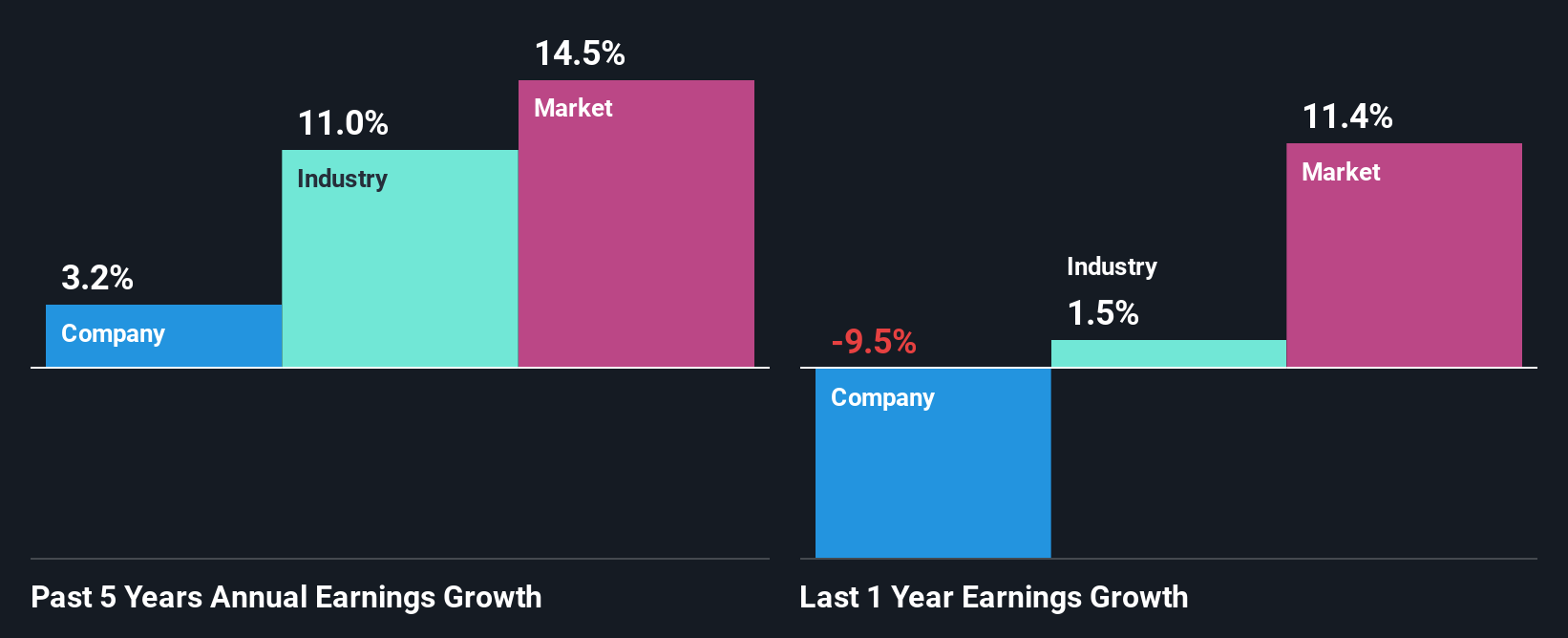- Saudi Arabia
- /
- Telecom Services and Carriers
- /
- SASE:7010
Is The Market Rewarding Saudi Telecom Company (TADAWUL:7010) With A Negative Sentiment As A Result Of Its Mixed Fundamentals?

With its stock down 8.7% over the past three months, it is easy to disregard Saudi Telecom (TADAWUL:7010). It seems that the market might have completely ignored the positive aspects of the company's fundamentals and decided to weigh-in more on the negative aspects. Stock prices are usually driven by a company’s financial performance over the long term, and therefore we decided to pay more attention to the company's financial performance. Particularly, we will be paying attention to Saudi Telecom's ROE today.
Return on equity or ROE is a key measure used to assess how efficiently a company's management is utilizing the company's capital. In other words, it is a profitability ratio which measures the rate of return on the capital provided by the company's shareholders.
How Do You Calculate Return On Equity?
ROE can be calculated by using the formula:
Return on Equity = Net Profit (from continuing operations) ÷ Shareholders' Equity
So, based on the above formula, the ROE for Saudi Telecom is:
12% = ر.س12b ÷ ر.س94b (Based on the trailing twelve months to March 2025).
The 'return' is the income the business earned over the last year. Another way to think of that is that for every SAR1 worth of equity, the company was able to earn SAR0.12 in profit.
See our latest analysis for Saudi Telecom
What Has ROE Got To Do With Earnings Growth?
Thus far, we have learned that ROE measures how efficiently a company is generating its profits. Based on how much of its profits the company chooses to reinvest or "retain", we are then able to evaluate a company's future ability to generate profits. Generally speaking, other things being equal, firms with a high return on equity and profit retention, have a higher growth rate than firms that don’t share these attributes.
Saudi Telecom's Earnings Growth And 12% ROE
It is quite clear that Saudi Telecom's ROE is rather low. However, when compared to the industry average of 9.6%, we do feel there's definitely more to the company. Having said that, Saudi Telecom's net income growth of 3.2% over the past five years is a bit low. Remember, the company's ROE is quite low to begin with, just that it is higher than the industry average. Hence, this goes some way in explaining the low earnings growth.
Next, on comparing with the industry net income growth, we found that Saudi Telecom's reported growth was lower than the industry growth of 11% over the last few years, which is not something we like to see.

Earnings growth is a huge factor in stock valuation. It’s important for an investor to know whether the market has priced in the company's expected earnings growth (or decline). By doing so, they will have an idea if the stock is headed into clear blue waters or if swampy waters await. Has the market priced in the future outlook for 7010? You can find out in our latest intrinsic value infographic research report.
Is Saudi Telecom Efficiently Re-investing Its Profits?
With a high three-year median payout ratio of 66% (or a retention ratio of 34%), most of Saudi Telecom's profits are being paid to shareholders. This definitely contributes to the low earnings growth seen by the company.
Additionally, Saudi Telecom has paid dividends over a period of at least ten years, which means that the company's management is determined to pay dividends even if it means little to no earnings growth. Based on the latest analysts' estimates, we found that the company's future payout ratio over the next three years is expected to hold steady at 72%. However, Saudi Telecom's ROE is predicted to rise to 16% despite there being no anticipated change in its payout ratio.
Summary
In total, we're a bit ambivalent about Saudi Telecom's performance. Specifically, the low earnings growth is a bit concerning, especially given that the company has a respectable rate of return. Investors may have benefitted, had the company been reinvesting more of its earnings. As discussed earlier, the company is retaining a small portion of its profits. That being so, the latest analyst forecasts show that the company will continue to see an expansion in its earnings. Are these analysts expectations based on the broad expectations for the industry, or on the company's fundamentals? Click here to be taken to our analyst's forecasts page for the company.
New: Manage All Your Stock Portfolios in One Place
We've created the ultimate portfolio companion for stock investors, and it's free.
• Connect an unlimited number of Portfolios and see your total in one currency
• Be alerted to new Warning Signs or Risks via email or mobile
• Track the Fair Value of your stocks
Have feedback on this article? Concerned about the content? Get in touch with us directly. Alternatively, email editorial-team (at) simplywallst.com.
This article by Simply Wall St is general in nature. We provide commentary based on historical data and analyst forecasts only using an unbiased methodology and our articles are not intended to be financial advice. It does not constitute a recommendation to buy or sell any stock, and does not take account of your objectives, or your financial situation. We aim to bring you long-term focused analysis driven by fundamental data. Note that our analysis may not factor in the latest price-sensitive company announcements or qualitative material. Simply Wall St has no position in any stocks mentioned.
About SASE:7010
Saudi Telecom
Provides telecommunications, information, media, and digital payment services in the Kingdom of Saudi Arabia and internationally.
Excellent balance sheet established dividend payer.
Similar Companies
Market Insights
Community Narratives





